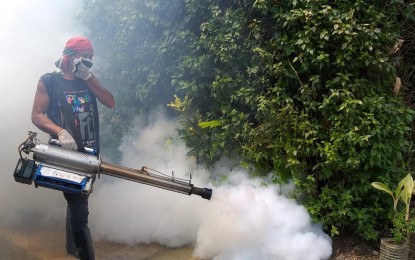
ANTI-DENGUE. A fogging activity in Guindapunan village in Palo, Leyte to kill adult mosquitoes. The Department of Health on Wednesday reported that there are 1,198 cases of dengue fever recorded from Jan. 1 to Feb. 8, 202019, 41-percent lower compared to last year’s same period. (Photo courtesy of Palo Municipal Health Office)
PALO, Leyte -- The Department of Health reported on Wednesday a decrease in the number of dengue cases recorded in Eastern Visayas early this year.
The 1,198 cases of dengue fever recorded from Jan. 1 to Feb. 8, 2020 is 41 percent lower compared to the same period last year with 2,020 cases, said John Paul Roca, DOH Eastern Visayas regional information officer.
“It might be lower than in the previous year, but still it is beyond the alert and epidemic threshold. This is still alarming and not normal, so we maintain and continue on our advocacy and implementation of interventions,” Roca told reporters in a press briefing on Wednesday.
There were already two deaths reported from the towns of La Paz and Abuyog in Leyte province in January.
“This is a large number because we are talking about life here. This is something that could have been prevented,” Roca said. Most people with dengue fever are in their 20s and 53 percent were males.
The health department asked city and town mayors to regularly organize cleanup campaigns focusing on the destruction of mosquito-breeding places in their areas and conduct community assembly in areas with dengue cases.
“We also notice that some communities become lax when they know that there are no more cases of dengue in their areas and stop doing interventions to prevent its spread. This is a concerted effort, from local to village levels to maintain the advocacy and implementation of interventions,” Roca said.
The official reiterated the DOH’s “4S” to fight dengue as an effective strategy to prevent cases and deaths.
These 4S strategies are the search and destroy mosquito breeding places, seek early consultation, self-protection method, and support fogging/spraying only in hot spot areas, where an increase in cases is registered for two consecutive weeks to prevent an impending outbreak.
The health official also assured the public that the implementation of other DOH programs will not stop amid the concern and enhanced efforts to prevent the spread of coronavirus disease 2019 (Covid-19).
“We asked the public to practice health measures not only for Covid-19 but also for dengue and vector-borne diseases,” Roca said.
Dengue fever is marked by the onset of sudden high fever, severe headache, and pain behind the eyes, muscles, and joints. Some may develop rashes and varying degrees of bleeding in different parts of the body. (PNA)
